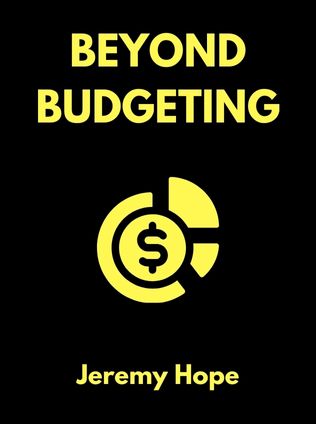
Beyond Budgeting
How Managers Can Break Free from the Annual Performance Trap
By Jeremy Hope,
Published 04/2003
About the Authors
Jeremy Hope and Robin Fraser are influential figures in the field of management and business performance. Both authors are Directors of the Beyond Budgeting Round Table, a collaborative network that emphasizes shared learning, performance management research, and consulting support. They have dedicated their careers to transforming traditional business practices and promoting innovative management models. Their work is widely recognized for its practical insights and thought leadership, particularly in helping organizations adapt to rapidly changing business environments.
Main Idea
The central thesis of Beyond Budgeting is a radical departure from traditional annual budgeting processes. Hope and Fraser argue that conventional budgeting is not only time-consuming and inefficient but also detrimental to organizational agility and ethical behavior. Instead, they propose an alternative management model that empowers front-line managers, fosters adaptive processes, and encourages a decentralized organizational structure. This model is designed to replace fixed targets with dynamic benchmarks and to shift decision-making authority closer to the customer. By doing so, organizations can respond more swiftly to market changes and create continuous value.
Table of Contents
- The Annual Performance Trap
- Breaking Free
- How Adaptive Process Opportunity Lets Managers Focus on Value Creation
- Principles of Radical Decentralization
- Insights into Changing Centralized Mind-Sets
- A Management Model for the 21st Century
The Annual Performance Trap
The traditional budgeting process is a deeply entrenched ritual in many organizations. CEOs and CFOs may appreciate the predictability and control it ostensibly offers, but the process is riddled with inefficiencies and drawbacks. Jeremy Hope and Robin Fraser identify three main issues with conventional budgeting:
- It is cumbersome and too expensive.
- It is misaligned with the competitive environment.
- It encourages gaming the numbers.
The budgeting process often takes four to five months and consumes up to 30 percent of senior executives' and financial managers' time. This enormous expenditure of resources yields questionable benefits, especially in today's fast-paced business world where agility is key. Furthermore, traditional budgeting fails to meet the needs of modern competitive environments. Shareholders demand top-tier performance, while customers expect rapid responses to their ever-changing needs.
Hope and Fraser also highlight how budgeting can lead to unethical behavior. They explain:
"The fixed performance contract is a deadly virus. It can lay dormant for years until an aggressive 'management by the numbers' leader comes along and activates it. It is a dismal way to manage a business." — Jeremy Hope and Robin Fraser
organizations that have suffered due to this rigid approach include Enron and WorldCom, where the pressure to meet fixed targets led to fraudulent practices. This dysfunctional focus on meeting budgeted figures rather than actual performance improvement stifles innovation and ethical conduct.
Breaking Free
Hope and Fraser showcase organizations that have successfully broken free from the annual budgeting cycle. These companies have eliminated the need for fixed performance contracts, instead opting for adaptive management processes and decentralized structures.
Sign up for FREE and get access to 1,400+ books summaries.
You May Also Like
Rich Dad Poor Dad
What the Rich Teach Their Kids About Money - That the Poor and Middle Class Do Not!
By Robert T. KiyosakiFreakonomics
A Rogue Economist Explores the Hidden Side of Everything
By Steven D. Levitt and Stephen J. DubnerThe Lean Startup
How Today's Entrepreneurs Use Continuous Innovation to Create Radically Successful Businesses
By Eric RiesWho Moved My Cheese?
An Amazing Way to Deal with Change in Your Work and in Your Life
By Spencer Johnson, M.D.Factfulness
Ten Reasons We're Wrong About the World – and Why Things Are Better Than You Think
By Hans RoslingMake Your Bed
Little Things That Can Change Your Life...And Maybe the World
By William H. McRaven



















